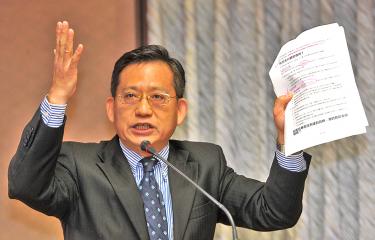A visit to Taiwan by the Dalai Lama could be considered as the Tibetan religious leader returning to China, because “Taiwan is also the land of China,” Chinese Nationalist Party (KMT) Legislator Wu Yu-sheng (吳育昇) said yesterday.
Democratic Progressive Party Legislator Chen Chih-mai (陳其邁) criticized Wu, saying that he might as well call Taiwanese legislators “members of China’s National People’s Congress.”
Wu made the remarks at a meeting of the legislature’s Internal Administration Committee to examine the budget of the Mongolian and Tibetan Affairs Commission, an agency that seems an incongruous fit for Taiwan, but still sits within the Republic of China’s institutional framework.
During a meeting with Mongolian and Tibetan Affairs Commission Minister Jaclyn Tsai (蔡玉玲), Wu said the Dalai Lama should be welcome to visit the nation, but China’s reaction should also be taken into consideration lest his visit be interpreted as encouraging Tibetan or Taiwanese independence.
“Since both sides of the Strait belong to one China,” Wu said, a visit by the Dalai Lama to Taiwan could be considered as “a return to China,” despite the Dalai Lama being banned from setting foot in China.
“Insofar as we, the KMT, uphold the ‘one China, different interpretations’ principle, Taiwan counts as China,” the legislator said.
Wu also said that the 11th incarnation of the Panchen Lama could also be invited to visit Taiwan so he could meet with and be “recognized” by the Dalai Lama, an arrangement that “should not be opposed by Beijing.”
Chen tore into Wu’s “outrageous proposal,” saying that the present Panchen Lama was controversially chosen by the Chinese government, while the one asserted by the Dalai Lama to be the actual 11th incarnation of the Panchen Lama is said to have been imprisoned since he was six years old, in 1995, and whose situation remains unknown to the outside world.
“If [arranging a meeting between the Dalai Lama and the Beijing-appointed Panchen Lama] does not count as an insult to the Dalai Lama, what does?” Chen asked.
Chen also lambasted Wu for calling Taiwan “China,” asking the KMT legislator whether they both were members of China’s National People’s Congress (NPC) and the committee an NPC committee.
Chen then asked Tsai whether she agrees with Wu’s claim that Taiwan is “China” so a visit to Taiwan is tantamount to a visit to China, whereupon Tsai said that the question should be referred to the Mainland Affairs Council (MAC).
Wu was unhappy with Tsai’s answer, calling her timidity in “guarding the country’s Constitutional position a public official’s malfeasance.”
MAC spokesperson Wu Mei-hung (吳美紅), in response to the uproar over Wu’s remarks, said that the cross-strait relationship has always been positioned as “one Republic of China, two regions” according to the Constitution of the Republic of China and the Act Governing Relations Between the People of the Taiwan Area and the Mainland Area (臺灣地區與大陸地區人民關係條例).
This understanding of the relationship has been unchanged for 20 years and has survived three presidents, she said.
Source: Taipei Times - 2014/10/24





















